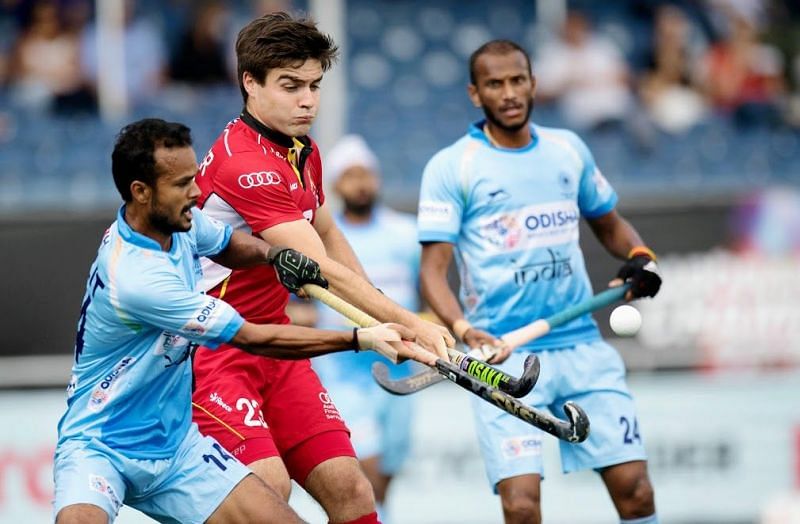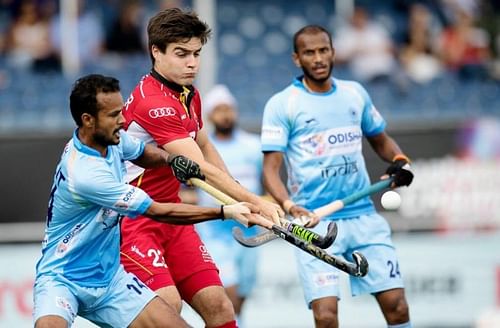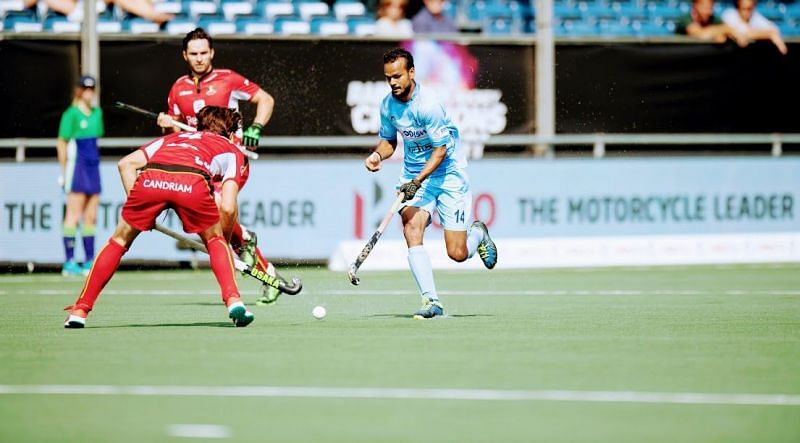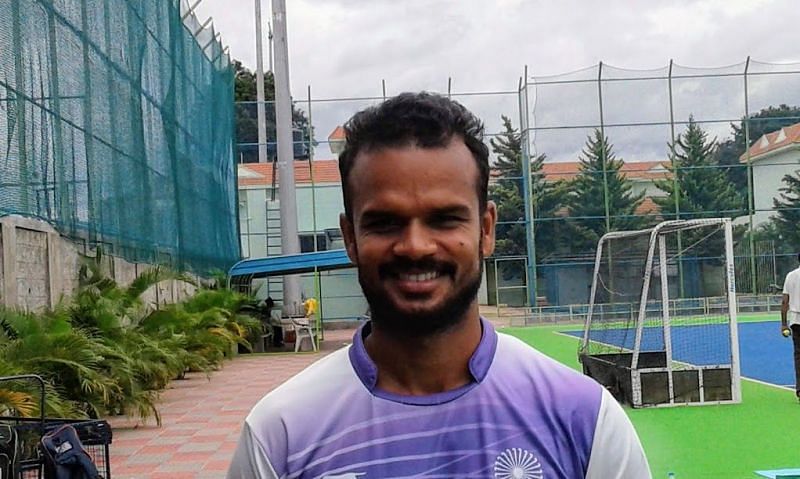
Asian Games 2018: 'Comeback after sting operation satisfying, but want to win medals for India,' says striker Lalit Upadhyay

Indian forward Ramandeep Singh was at his best against Pakistan at Breda and scored the opening goal of the Champions Trophy. Ramandeep was in some discomfort during the first half but continued to play until the very end of the match when he delivered an assist to Lalit which resulted in India's fourth goal in the final seconds.
"We wanted to win a medal for Raman"
After the match, the pain became excruciating to the point that he was unable to move and scans picked up a chondral fracture. The Jalandhar lad had to return to India to undergo further tests and could play no further part in the competition.
Ramandeep is now recovering at the Bangalore camp following surgery and hopes that he will be fit in time for the World Cup but as of now, there is no certainty of that happening.
"The boys helped me a lot in the hospital and continue to do so here as well. Am hoping that I can recover soon," said the man who had returned to the team after missing out at Gold Coast.
Ramandeep may have been grateful, but his teammates do not think they have done him any favors and feel instead that they owe him a lot for his contribution to the squad. Fellow striker Lalit Upadhyay was emphatic that the players wanted to give Ramandeep a gift when they got back from Breda.
"We wanted to take a medal back for Raman's sake as he would feel better if he knew we had achieved something. His contribution to the team has been immense."
Like every other member of the team, Lalit Upadhyay is upbeat after India's resounding show at Breda but unlike many others, he is a man in a hurry and hopes further success comes his way by virtue of the team winning a lot more medals. Making up for lost time is obviously high up in the list of priorities.
"I play each match like it is my last. I know I will not be playing forever, but as long as I am in the team, I will continue to give my best," says the Varanasi lad with a philosophical air.
"After the incident happened, I did my best to act as normally as I possibly could. I adopted a mindset wherein I did not care so much about the people around me."
The infamous incident which the Indian striker was referring to was anything but commonplace and was of a scale and magnitude that was quite unprecedented. The landmark event shook the nation and led to widespread changes, but sadly for Lalit, it also forced him to consider quitting the game and retreating into oblivion.
Lalit Upadhyay - caught in a controversy he knew nothing about

With a mixture of grief and disbelief, stunned Indian hockey fans were at a complete loss as to how to react to their team's failure to qualify for the Beijing Olympics.
It was in March 2008 that Great Britain defeated India in the final of the Olympic qualifiers in the Chilean capital Santiago as a result of which the eight-time gold medallists could not make it to China. Prabjot Singh bagged the best player award but Indian hockey, it seemed had reached its absolute nadir.
Worse was to follow, however, and a month later, a rather shocking and unsavoury occurrence shook the very roots of Indian sport and plummeted the erstwhile national game to a new low. The repercussions of the event were severe enough to end the reign of the 80-year-old federation which governed field hockey in India.
At the heart of the matter was a television news channel, under the guise of a business house, with an interest in conducting a hockey tournament. The channel established contact with the Secretary of the Indian Hockey Federation and offered a bribe for including a player of their choice in the Azlan Shah Cup to be played later that year.
As a result of the operation which was telecast, the Indian Hockey Federation was disbanded and Hockey India was subsequently formed. The fortunes of the Indian team have changed for the better ever since and some could argue that the media house in question deserved accolades for serving to revive Indian hockey.
Unwittingly, perhaps, the media house had not spared a thought for the player from Uttar Pradesh who they had named as part of Operation Chak De. As the momentous changes unfolded under the fearsome glare of the media, a young teenager's life was very nearly shattered for no fault of his.
The player who was named knew nothing about any of the parties involved. Most importantly, he had nothing to gain from the episode and the people who took his name were not even aware of exactly who he was.
Yet, a promising career almost came to a catastrophic end as the talented player was ignored and sidelined by the selectors and scornfully looked upon by those who mistakenly believed that he was guilty.
In an exclusive interaction with Sportskeeda, Lalit Upadhyay gets candid about how the sting op changed his life and the manner in which he defied the odds to script a heroic comeback.
SK: What do you think are the biggest positives about this set-up as compared to the past? What was the experience like at Breda?
Lalit: We are lucky to have an Indian coach who we are really comfortable with and under whom we are doing well. Of course, we were well aware of his capabilities after he won gold for India in the Junior World Cup.
The Champions Trophy was his first tournament with us and we still managed to perform creditably and win silver. We could have won gold, and that is the biggest regret.
Every coach has his own methods but a successful coach is the one who delivers results.
Modern hockey is so fast that even if a player is on the bench for a couple of minutes, the opposition has a distinct advantage. After Ramandeep's injury, we had to step up and we were determined to play well. We were quite dejected when we learned that he would not be able to take any further part in the tournament.
Our coach (Harendra Singh) motivated us a lot and pumped us up saying we had to win a medal no matter what. He spoke to each player individually and that boosted the spirits of the entire team.
"People used to regard me with suspicion and that left me devastated"
SK: How difficult was it to maintain your focus and composure after the unfortunate incident of 2008?
Lalit: I was really young (around 16) in 2008 when the unpleasant incident happened. I was never comfortable discussing the topic as I was quite disgusted with the media back then. I was doing really well as a junior before it all ended. No boy of that age would have been able to handle an incident of such a nature and it was no different with me.
People used to regard me with suspicion and that left me devastated. I had never been to a hostel or a hockey academy like most others and people were also curious to know how I made it to the top.
The truth was that the selectors had spotted me doing well and I was picked as part of a talent search programme.
Eventually, the hostility I faced all around took it's toll on me to the point that I wanted to bid adieu to the game once and for all. My mum, however, insisted that I continue and reasoned that if I attempted to retreat, people would assume incorrectly that the allegations were true. She wanted me to play well to show the world that I was in the team on merit and not because money had exchanged hands.
I hail from a middle-class background and playing hockey was my only source of earning a livelihood. The reason I wanted to continue playing was to improve my game and wait for the day when people would walk up and tell me that they like the way I play. Chasing that dream bit by bit has brought me to where I am today.
I was at the senior camp in 2008 and was unable to return until 2014. Ten years back, SV Sunil was at the camp and so was Sreejesh. I was quite comfortable with them although I was too young to bond much. Danish Mujtaba, Diwakar Ram, and Tushar Khandker were in the team then and I was pretty close to them.
My aim was to do as well as I could in the game which I loved and I decided to pursue the same with single-minded determination - of course, something else altogether happened.

"I wanted to play for India - earning a living through hockey was not the aim anymore"
SK: How and when did you first decide to pursue hockey as a career?
Lalit: Varanasi has produced some really good players over the years. I started playing hockey along with my elder brother when he was in college, and it was a means for me to skip classes at school. My coaches told me that I had a lot of skill and I then joined the SAI center there. Being quite honest, what drove me and other boys there to pursue the game initially was the fact that doing well led to a job and also a source of income.
Gradually, my game improved and, with it, I developed a new set of aspirations. Subsequently, the inclination to play for India outweighed all else. My coach, Parmanand Mishra helped me to expand my horizons and aim high in addition to supporting me financially.
My coaches often said that if I restricted myself to playing good hockey, I would continue doing just that - if I played excellent hockey, I would be selected for the camp, and I had further qualities of my own to add to that, only then would I make it to the national team.
I also had the responsibility to improve the financial status of my family and a combination of these factors drove me to work harder.
SK: Are you happy and satisfied now? Has the bitterness worn off?
Lalit: Every time I play a tournament, I always strive to do well for the team so I can win a medal for the country. Our mission in the Asian Games is to qualify for the Olympics, maintain our ascendancy over our continental rivals, and justify our rankings. In the World Cup, we will take it one game at a time.
Learning to cope with adversities and past events make you a stronger person. There are ups and downs in life but the manner in which one overcomes barriers determines whether or not one succeeds. I believe that good times always follow bad times.
It is, to an extent satisfying that I fought this battle all alone and there was no one by my side when things were at their worst. I am asked, at times, to deliver motivational speeches in schools and colleges regarding how I came out unscathed after the trauma.
I will be a lot more satisfied if we as a team win a lot more medals and that will be the ultimate source of happiness for me.